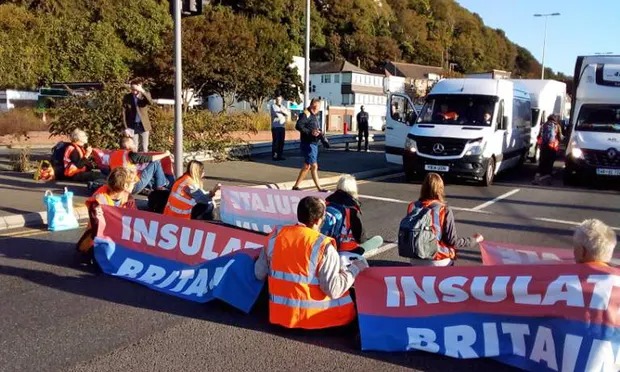More than 40 climate protesters have blocked roads around the UK’s busiest port as part of a campaign to tackle fuel poverty and reduce the UK’s climate emissions.
Campaigners from the group Insulate Britain blocked the A20 around Dover just after 8.15 on Friday morning.
The protests – which are demanding that all UK housing is fully insulated by 2030 – have brought widespread disruption, with activists repeatedly blocking sections of the M25 over the past 10 days.
They have been condemned as selfish and dangerous by politicians and drawn an angry reaction from many motorists.
Earlier this week the government successfully applied to the high court for an order which prohibits anyone from blocking the M25 – the scene of previous protests by the group. Anyone who breaks the injunction could be found to be in contempt of court, which carries a maximum penalty of two years in prison or an unlimited fine.
However, a spokesperson for the protesters said the injunction did not apply to the protests in Dover.
In a statement the group added: “We are sorry for the disruption that we are causing. It seems to be the only way to keep the issue of insulation on the agenda and to draw attention to how poorly insulated homes are causing ill health, misery and early death for many thousands of people.
“We are failing the country’s cold hungry families and the elderly and placing an enormous burden on the NHS.”
Previous protests by the group have seen activists glue themselves to the road at key junctions around the M25 causing long tailbacks and there have been more than 300 arrests.
Senior Tory politicians have criticised the group saying they are putting themselves and members of the public in danger.
Earlier this week the transport secretary, Grant Shapps, said: “Invading a motorway is reckless and puts lives at risk.”
But the protesters have vowed to continue their campaign, which they say highlights the urgent need to improve the UK’s poor housing stock, rated as some of the worst in Europe, to tackle carbon emissions, fuel poverty and public health.
A spokesperson for the group said: “Insulating our leaky homes is one of the most cost-effective ways to reduce carbon emissions and it has all these additional benefits – reducing fuel poverty, creating jobs, reducing the burden on the NHS and protecting people from overheating during future heatwaves. It’s a no-brainer. Boris just needs to get on with the job.”
Source: The Guardian


